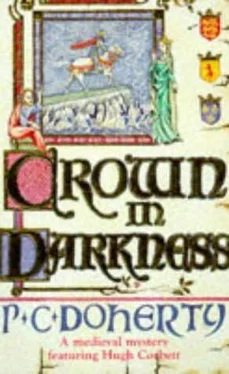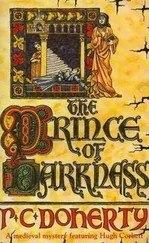Paul Doherty - Crown in Darkness
Здесь есть возможность читать онлайн «Paul Doherty - Crown in Darkness» весь текст электронной книги совершенно бесплатно (целиком полную версию без сокращений). В некоторых случаях можно слушать аудио, скачать через торрент в формате fb2 и присутствует краткое содержание. Жанр: Исторический детектив, на английском языке. Описание произведения, (предисловие) а так же отзывы посетителей доступны на портале библиотеки ЛибКат.
- Название:Crown in Darkness
- Автор:
- Жанр:
- Год:неизвестен
- ISBN:нет данных
- Рейтинг книги:4 / 5. Голосов: 1
-
Избранное:Добавить в избранное
- Отзывы:
-
Ваша оценка:
- 80
- 1
- 2
- 3
- 4
- 5
Crown in Darkness: краткое содержание, описание и аннотация
Предлагаем к чтению аннотацию, описание, краткое содержание или предисловие (зависит от того, что написал сам автор книги «Crown in Darkness»). Если вы не нашли необходимую информацию о книге — напишите в комментариях, мы постараемся отыскать её.
Crown in Darkness — читать онлайн бесплатно полную книгу (весь текст) целиком
Ниже представлен текст книги, разбитый по страницам. Система сохранения места последней прочитанной страницы, позволяет с удобством читать онлайн бесплатно книгу «Crown in Darkness», без необходимости каждый раз заново искать на чём Вы остановились. Поставьте закладку, и сможете в любой момент перейти на страницу, на которой закончили чтение.
Интервал:
Закладка:
The horses were saddled and he and the silent Aaron were soon clattering across the drawbridge. A solitary knight was waiting for them and Benstede recognised Sir James Selkirk, Wishart's man and the captain of that prelate's household. 'Why, Sir James,' Benstede remarked. 'Have you come to see us off? Or do you bear messages from your master?' Selkirk slowly shook his head. 'Certainly not, Master John. I am simply making my way back into the castle, though I understand from His Grace, Bishop Wishart, that you are leaving Scotland today!' 'Well, not today,' Benstede jovially replied. 'It will take us at least three days hard riding to reach the border. You must be glad that we are going.' 'Visitors from England,' Selkirk quietly replied, 'are always welcome. Your countryman, Master Hugh Corbett, is already on his way. I bid you adieu!' Benstede nodded, dug the spurs into his horse, and clattered on his journey.
They bypassed Edinburgh and were soon into the soft countryside, making their way south-west to the border and security of Carlisle Castle. A beautiful summer's day, the strong sun's rays striking like a blade through the canopy of trees as the countryside slept in the summer haze. Towards evening they found themselves still in open country so Benstede decided that they must camp and indicated a copse of trees in the far distance. 'We will stay there,' he told his silent companion. 'We will eat, sleep and continue our journey tomorrow.' Benstede repeated what he had said with deft, smooth signals of his fingers and Aaron nodded. They approached the copse and followed the path as it narrowed into a hollow, splashing through the reedy shallows of a small stream and disturbing the blue dragonflies which hung there still enjoying the warmth of the dying sun. Benstede went further on, stopped and looked round for a suitable place to camp.
Satisfied with the day's journey, Benstede lifted the wineskin from his saddle and, pulling back the stopper, raised it up so its sweet contents splattered into his parched mouth. A crossbow bolt thudded into his exposed chest. Benstede lowered the wineskin slowly and coughed in surprise as both wine and blood dribbled from his mouth. He turned and looked for Aaron but his silent companion was already dead, a second crossbow bolt taking him full in the throat. Benstede slumped like a drunken dreamer from his saddle, the wineskin falling from his hand and the red wine spluttering in circles on the ground as it mixed with the blood pouring from both his mouth and chest. A bird whistled overhead and the dying man almost answered it with the bubbles breaking in his own throat. The smell of crushed grass tickled his nostrils as Benstede wondered what was happening to him. 'Corbett!' he thought. 'Corbett was responsible.' He had made, Benstede reflected in his dying moments, the most serious mistake of his life. He had trusted Corbett. He thought Corbett knew the rules. Nevertheless, Benstede comforted himself, he had done what he had to do. His agents in the Norwegian court in Oslo already had their instructions. It would all be well in the end. He felt the blood rise like a gorge in his throat as the darkness came quietly crashing round him.
In the shadows of the trees Sir James Selkirk carefully put down the huge crossbow he carried and, drawing his sword, walked soundlessly over to the prostrate figures. Aaron was dead, slumped like some sleeping child, face down on the earth. Benstede lay on his back, hands outstretched, lips still silendy moving as his eyes glazed over. Selkirk stood and watched him die. 'You see, Master Benstede,' he murmured softly. 'I was right! You are leaving Scotland today!'
Selkirk looked around. He had followed both riders ever since they had left Edinburgh Castle. It had been easy. They had suspected nothing and so expected nothing. The knight had thought he would have to wait longer, but when he realised his quarry intended to sleep out in the open in a lonely Scotish wood, then he knew that such an opportunity could not be resisted. Selkirk walked silendy back through the wood until he came to a small clearing hidden by a canopy of trees. The ground was soggy and easy to break up and, quickly digging a shallow grave, he dragged the bodies of both men into it. He also dug a small hole for the saddles and other baggage after he had rummaged through them for anything of value for himself or his master. The unsaddled horses and ponies were then pricked in the haunches and sent cantering into the gathering darkness. Selkirk was confident that they would find their way back to some farmstead or village where the local peasants would hardly believe their good fortune. Satisfied that all was done, Selkirk collected his own horse and made his way back to Edinburgh. Already he knew his master would be preparing the draft letter to Edward of England sadly answering Edward's expected enquiry on the "whereabouts of his envoy". After all, such accidents, as Wishart would caustically comment, were common occurrences in Scotland.
AUTHOR'S NOTE
The death of Alexander III occurred as described in these pages. The King and Queen Yolande were often apart and, on the evening of 18th March 1286, the King did announce, to the surprise of all his Council, that he intended to ride through a storm across the dangerous Firth of Forth and so reach Queen Yolande at Kinghorn Manor. The Council, convened to discuss the imprisonment of a Scottish baron, loudly objected and protested that the inclement weather was against such a journey. Alexander, however, persisted and his Councillors did not demur for Alexander's wild rides around Scotland were an accepted fact of life. The King left Edinburgh with two body-squires and crossed at Queensferry. Both the ferrymaster and the waiting purveyor, Alexander, did try to restrain the King but their protests were of no avail. The King began his wild ride into the fierce storm and fell to his death from Kinghorn Ness.
It is a matter of speculation whether the King's fall was an accident or murder. Many did stand to gain from his death. The Bruces and the Comyn faction ignored Bishop Wishart and eventually drifted into savage inter-clan rivalry. Edward of England continued to act as a mediator, though it is interesting that at the time of Alexander's death he arranged huge loans to the Norwegian king and had despatched envoys to the Pope to ask for papal permission for his young son to be betrothed to the Maid of Norway. Philip IV of France was also interested in Scottish affairs and continued to be so throughout his reign. Eventually Edward of England showed his hand. At first he acted as an honest broker between the rival Scottish claims to the throne, but then only supported the candidate who was prepared to accept his liegeship over Scodand. The Maid of Norway never reached Scodand but mysteriously died on the voyage over. This was the signal for the Bruce faction to advance their claims and a savage war between England and Scotland broke out which lasted decades and cost countless lives.
Many people believe that power politics between great nations is a development of the late 19th and early 20th centuries. This is not so. Edward I had very clear ideas about empire and conquests and Philip IV of France was no different. The latter too had dreams of obtaining an empire in Europe greater than Charlemagne. He regarded the Pope, who had fled to Avignon in Southern France, as simply an extension of his own influence. He married his sons and daughters off to the greatest nobles of Europe and later had a formal alliance with Scotland against England. Philip's political philosophy was expressed by one of his lawyers, Pierre du Bois, whose writings are still extant and prove fascinating reading. This constant clashing between the Plantagenets of England and the Capetians of France not only fuelled the war in Scodand but was one of the major causes for the later Hundred Years War which ranged from the Low Countries to Spain.
Читать дальшеИнтервал:
Закладка:
Похожие книги на «Crown in Darkness»
Представляем Вашему вниманию похожие книги на «Crown in Darkness» списком для выбора. Мы отобрали схожую по названию и смыслу литературу в надежде предоставить читателям больше вариантов отыскать новые, интересные, ещё непрочитанные произведения.
Обсуждение, отзывы о книге «Crown in Darkness» и просто собственные мнения читателей. Оставьте ваши комментарии, напишите, что Вы думаете о произведении, его смысле или главных героях. Укажите что конкретно понравилось, а что нет, и почему Вы так считаете.












